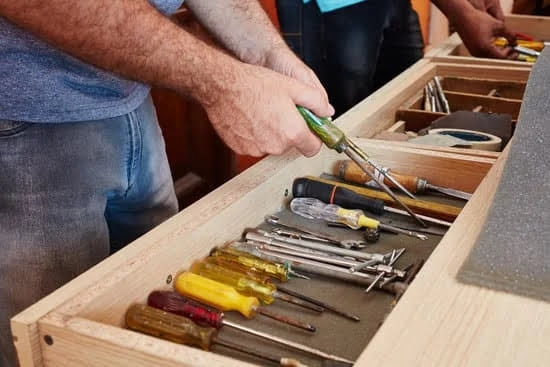When providing woodworking services, it is crucial to understand how to charge sales tax accurately. Knowing how to charge sales tax for woodworking services can help your business stay compliant with the law and avoid potential penalties.
This article will provide an overview of the sales tax laws specifically related to woodworking services, outlining the steps to determine the correct sales tax rate, differentiate between taxable and non-taxable services, as well as how to register for a sales tax permit.
Woodworking services are subject to sales tax in many states, making it essential for businesses in this industry to familiarize themselves with the relevant laws and regulations. By understanding the importance of charging sales tax for woodworking services, businesses can ensure they are meeting their legal obligations while also effectively managing their finances. Whether you are a seasoned woodworker or just starting out in the industry, knowing how to properly handle sales tax can contribute to your success.
In the following sections, we will delve into the specifics of sales tax laws for woodworking services, including steps on determining the appropriate rate based on location and service type. Additionally, we will discuss how to differentiate between taxable and non-taxable woodworking services and provide guidance on registering for a sales tax permit.
Stay tuned for valuable insights on collecting and remitting sales tax, common mistakes to avoid, and resources for staying informed about changes in sales tax laws specific to woodworking services.
Overview of Sales Tax Laws for Woodworking Services
When it comes to providing woodworking services, understanding and complying with sales tax laws is crucial. Sales tax is a consumption tax that is imposed on the sale of goods and services. For woodworking businesses, this means that sales tax must be collected from customers on the total amount charged for the services provided. This revenue is then remitted to the appropriate taxing authorities.
Why Charge Sales Tax for Woodworking Services
Charging sales tax for woodworking services not only ensures compliance with state and local laws but also helps contribute to the overall funding of public services such as schools, roads, and infrastructure. By collecting and remitting sales tax, woodworking businesses play a vital role in supporting their communities.
Understanding Sales Tax Laws
Sales tax laws vary by state, so it’s essential for woodworking businesses to familiarize themselves with the specific regulations in their operating area. These laws dictate how much sales tax should be collected, when it should be remitted, and any exemptions or special rules that may apply to certain types of woodworking services. Staying informed about these laws will help avoid potential fines or penalties for non-compliance.
Steps to Determine the Sales Tax Rate for Woodworking Services
When it comes to charging sales tax for woodworking services, one of the essential steps is determining the correct tax rate to apply. The first crucial factor to consider is the location where you are providing your woodworking services.
Each state has its own sales tax rate, and some local jurisdictions may also impose additional sales tax on purchases. To accurately determine the sales tax rate, you must research and understand the rates applicable in the specific areas where you conduct business.
Another consideration when determining the sales tax rate for woodworking services is whether your services are considered taxable in the eyes of the law. In some states, labor for installing, maintaining, or repairing tangible personal property is exempt from sales tax.
However, if your woodworking services involve selling tangible products along with labor, you might have to charge sales tax on both components. It is crucial to carefully review state laws and regulations regarding what is considered taxable within woodworking services.
To simplify the process of calculating and applying the correct sales tax rate for your woodworking services, utilizing online resources provided by state revenue departments can be highly beneficial. Many states offer online tools that allow you to enter specifics about your transactions and automatically calculate the applicable sales tax rate. By staying informed about these resources and tools available, you can ensure compliance with laws and regulations while accurately charging sales tax for your woodworking services.
| Tax Rate Determination Factor | Importance |
|---|---|
| Location of service provision | Crucial in determining state and local rates |
| Taxable vs non-taxable services | Determines which components are subject to sales tax |
| Utilization of online resources/tools | Aids in accurate calculation and application of sales tax rates |
Differentiating Between Taxable and Non-Taxable Woodworking Services
Woodworking services can encompass a wide range of activities, from crafting custom furniture to building cabinets and installing woodwork in homes. When it comes to charging sales tax for these services, it is crucial to understand the difference between taxable and non-taxable woodworking services. This knowledge will ensure compliance with sales tax laws and avoid potential penalties or fines.
Taxable woodworking services typically involve the sale of tangible personal property, such as custom-made furniture or pre-built wooden items. In most states, any transaction that involves the transfer of tangible goods is subject to sales tax unless specifically exempted. On the other hand, non-taxable woodworking services may include labor charges for installation, repair, or restoration of woodwork without any tangible property being sold.
To determine whether a specific woodworking service is taxable or non-taxable, it is essential to consult the sales tax laws in your state. Each state has its own regulations regarding what constitutes a taxable transaction and what qualifies for an exemption. Additionally, some states may have different tax rates for labor versus materials in woodworking services. Understanding these distinctions will help you accurately charge sales tax for your woodworking services.
One way to differentiate between taxable and non-taxable woodworking services is to keep detailed records of all transactions and clearly outline the breakdown of charges to clients. By maintaining accurate documentation of labor costs versus material costs, you can easily identify which portion of your invoice is subject to sales tax. Additionally, staying informed about any updates or changes in sales tax laws related to woodworking services can help you adapt your pricing strategy accordingly.
| Items | Details |
|---|---|
| Taxable Woodworking Services | Custom-made furniture |
| Non-Taxable Woodworking Services | Labor charges for installation |
| Tax Rates | Vary by state; check local regulations |
How to Register for a Sales Tax Permit for Woodworking Services
Understanding the Sales Tax Permit Requirement
In the world of woodworking services, it is essential to understand the requirement of obtaining a sales tax permit. This permit allows you to legally collect and remit sales tax on taxable transactions within your business. It is a crucial step in complying with state laws and regulations regarding sales tax. Without this permit, you could face penalties and fines for not properly charging sales tax for your woodworking services.
Applying for a Sales Tax Permit
The process of registering for a sales tax permit for your woodworking services varies depending on your state’s requirements. Generally, you will need to visit your state’s department of revenue website and fill out an application form.
You may be required to provide information about your business, such as its legal structure, address, and federal employer identification number (EIN). Once your application is submitted, you will receive your sales tax permit which will enable you to start collecting sales tax from your customers.
Maintaining Compliance With Sales Tax Laws
After receiving your sales tax permit for woodworking services, it is essential to stay informed about any changes in sales tax laws that could affect your business. Make sure to regularly check updates from your state’s department of revenue or consult with a tax professional to ensure that you are correctly applying the sales tax rate and complying with reporting requirements.
By staying compliant with these laws, you can avoid costly mistakes and keep your woodworking services business running smoothly.
Collecting and Remitting Sales Tax for Woodworking Services
As a woodworking business owner, it is crucial to understand the process of collecting and remitting sales tax for your services. Charging the correct amount of sales tax ensures compliance with state laws and regulations while also avoiding penalties and fines. In this section, we will discuss the steps involved in effectively collecting and remitting sales tax for woodworking services.
The first step in collecting sales tax for woodworking services is determining the appropriate rate to charge based on your location. Sales tax rates vary from state to state and even within different local jurisdictions. It is essential to research the specific sales tax rates applicable to your woodworking business’s location. You can typically find this information on your state’s department of revenue website or by contacting them directly.
Once you have determined the correct sales tax rate for your woodworking services, you will need to begin collecting the tax from your customers at the time of sale. This can be done by including the sales tax amount in the total invoice or clearly stating it separately. It is important to keep detailed records of all sales transactions, including the amount of sales tax collected from each customer.
On a regular schedule, usually monthly or quarterly depending on state requirements, you will need to remit the collected sales tax to the appropriate taxing authority. This can typically be done online through your state’s department of revenue website or by submitting paper forms along with payment. By adhering to these steps, you can ensure that you are properly collecting and remitting sales tax for your woodworking services in compliance with state laws and regulations.
Remember that failure to collect or remit sales tax correctly can lead to audits, penalties, and interest charges. Therefore, it is vital to stay organized and up-to-date on your responsibilities as a woodworking business owner regarding charging and remitting sales tax. By following these guidelines, you can protect your business from potential legal issues and maintain a good standing with relevant authorities.
Common Mistakes to Avoid When Charging Sales Tax for Woodworking Services
When it comes to running a woodworking business, one of the key aspects that cannot be overlooked is charging sales tax. Understanding how to charge sales tax for woodworking services is crucial in order to comply with state laws and regulations. However, there are common mistakes that many woodworking businesses make when it comes to handling sales tax. By being aware of these mistakes, you can ensure that you are properly collecting and remitting sales tax for your services.
Here are some common mistakes to avoid when charging sales tax for woodworking services:
- Failure to determine the correct sales tax rate: One of the most common mistakes that woodworking businesses make is not determining the correct sales tax rate for their services. The sales tax rate can vary depending on the location of your business and where the service is being provided. It is important to research and accurately calculate the appropriate sales tax rate for each project.
- Not differentiating between taxable and non-taxable services: Another mistake that woodworking businesses often make is not differentiating between taxable and non-taxable services. While some woodworking services may be exempt from sales tax, others may be subject to it. It is essential to understand which services are taxable in your state in order to charge the appropriate amount of sales tax.
- Failure to register for a sales tax permit: Some woodworking businesses fail to register for a sales tax permit with their state taxing authority. It is important to obtain a permit before providing any taxable services in order to legally collect and remit sales tax. Failure to do so can result in penalties and fines.
Avoiding these common mistakes can help ensure that your woodworking business remains compliant with sales tax laws. By taking the time to understand how to charge sales tax for woodworking services correctly, you can protect your business from potential issues in the future.
Resources for Staying Up-to-Date on Sales Tax Laws for Woodworking Services
Staying informed about sales tax laws is crucial for any woodworking service business to ensure compliance and avoid costly penalties. Here are some resources to help you stay up-to-date on sales tax laws specific to woodworking services:
- State Department of Revenue Websites: Each state has its own department of revenue website where you can find valuable information on sales tax regulations, forms, and deadlines. Make sure to regularly check these websites for any updates or changes in the laws that may impact your woodworking business.
- Industry Publications and Websites: Subscribing to industry-specific publications or websites can provide you with insights and updates on sales tax laws relevant to woodworking services. These resources often include articles, guides, and forums where you can discuss best practices with other woodworking professionals.
- Consulting with Tax Professionals: It’s always a good idea to consult with a tax professional who specializes in woodworking services. They can offer personalized guidance on how to charge sales tax for your specific type of woodworking services and help you navigate any complex regulations.
Additionally, attending workshops, seminars, or webinars focused on sales tax for woodworking services can also be beneficial. These events typically cover important topics such as how to calculate sales tax rates, proper record-keeping practices, and updates on legislative changes that may affect your business.
By utilizing these resources and staying proactive in staying informed about sales tax laws, you can ensure that your woodworking service business remains compliant and operates smoothly within the bounds of the law. Remember that ignorance is not an excuse when it comes to charging sales tax for your woodworking services, so take advantage of these tools to protect your business.
Conclusion
In conclusion, understanding how to charge sales tax for woodworking services is crucial for any woodworking business owner. By following the steps outlined in this guide, you can ensure that you are compliant with sales tax laws and regulations. Remember that accurately determining the sales tax rate, differentiating between taxable and non-taxable services, and registering for a sales tax permit are essential steps in the process.
When it comes to collecting and remitting sales tax for woodworking services, consistency is key. Make sure to keep detailed records of all transactions, including taxes collected. Additionally, staying up-to-date on any changes in sales tax laws is important to avoid costly mistakes or penalties.
By avoiding common mistakes and utilizing available resources to maintain your knowledge of sales tax laws, you can successfully navigate the process of charging sales tax for woodworking services. Ultimately, by following these tips and guidelines, you can ensure compliance with state regulations and contribute to the financial stability of your woodworking business.
Frequently Asked Questions
What Can I Write Off for a Woodworking Business?
When running a woodworking business, there are several expenses you can potentially write off to reduce your tax liability. These include the cost of materials, tools and equipment, workspace rent or mortgage interest, utility bills, marketing expenses, business insurance premiums, and vehicle expenses related to your business activities.
Do General Contractors Charge Sales Tax in California?
In California, general contractors are generally required to charge sales tax on their services. However, it’s important to note that the sales tax rates can vary depending on the location where the work is being performed.
Contractors need to register for a seller’s permit with the California Department of Tax and Fee Administration to collect and remit sales tax.
Are Handyman Services Taxable in Washington State?
Handyman services in Washington State are subject to sales tax. If you are providing repair or maintenance services for residential or commercial properties, you will likely need to collect sales tax from your customers. It’s essential to register for a Washington State business license and a Unified Business Identifier (UBI) number before offering taxable handyman services.

Hi everyone! I’m a woodworker and blogger, and this is my woodworking blog. In my blog, I share tips and tricks for woodworkers of all skill levels, as well as project ideas that you can try yourself.





